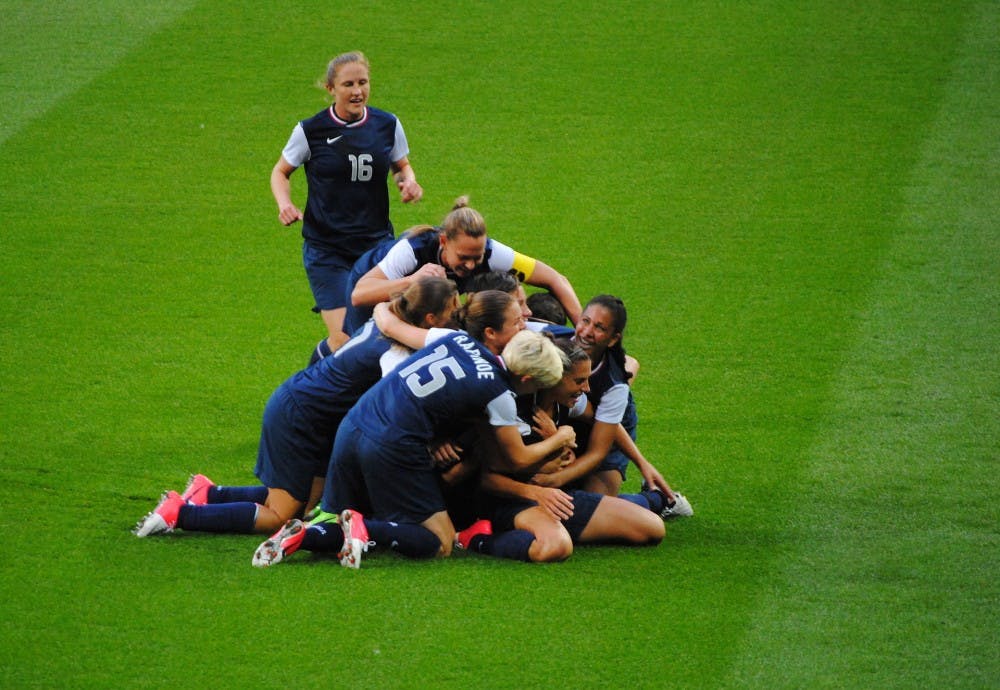A few days ago, under the secure cover of the COVID-19 panic, the Biden assault allegations, and reports of killer wasps, a judge rejected the main claim in the lawsuit regarding U.S. Soccer and the embattled U.S. women’s national soccer team in their fight for pay equality. The press it once had is now gone, and it went otherwise unnoticed to those who weren’t actively following the matter.
Though newspapers across the U.S., concerned activists, and even Princeton University itself decry the sexism in society, both past and present, against women, they nevertheless show evident favoritism in promoting men’s sports and in discreetly and subtly denouncing women’s athletics. This indifference only feeds the toxic anti-female environments that flourish around the world.
As the COVID-19 crisis sank its teeth into the sports world in March, causing chaos and cancellations for athletic events across all abilities and identities in the United States, some news corporations chose to focus solely on men’s athletics, despite women’s sports being similarly impacted.
For example, when I recently read a CNN News article that referred to the NCAA March Madness tournament as the “the men's Division I basketball tournament” when it was canceled this March, I thought that it was excluding or forgetting the women’s tournament. Though aggravating, this sentence was actually painfully accurate: “March Madness” is the name given only to the men’s tournament, whereas the women’s tournament does not bear a similarly catchy title.
This is only one of many examples online, on-air, and in print where mainstream media actively ignores the woman athlete. When they aren’t ignored, they are below-the-fold, buried in the section, aired during daytime or extreme late-night hours when nobody is watching, or mentioned on niche or third-party broadcasts that fall on few ears.
This failure to show public support, concern, and adequate media coverage of women’s sports is not just disenchanting, it’s dangerous. It says to women of all backgrounds who participate in any form of sports that their games do not matter. It discourages the younger generations of women and gives them fewer role models — why work hard and win when a man who does the same thing will be celebrated (and paid) so much more than you, just because you are a girl?
Though Princeton has made laudable efforts to recognize and support women in academics, these practices have a little trouble reaching the athletics realm. Princeton teams charge nothing for admission for many sporting events — men’s and women’s — but there are significantly more men’s games that require a paid-for ticket. The only charged admission to the women’s sports is women’s basketball, and even then, the ticket charges are $8–10 for women’s basketball games, whereas men’s basketball games are $10–15.
Some may argue that price inflation is linked to higher-demand commodities, but this price difference creates a false perspective in the spectator. For example, we have been conditioned to see a cheaper price as an indicator of inferiority. Thus, the price of a Princeton women’s basketball ticket immediately claims that women’s basketball is the second-class sport. Nobody does this to be specifically predatory, but it is still an issue. To repair this, the men’s basketball tickets could be reduced to the same price as the women’s. Or all athletics events could have donation-based admission where there is a suggested price, and people pay what they can.

This false perception of the inferiority of women’s sports at Princeton can be squashed by simple statistics: in 66 years of the Ivy League’s existence since 1954, male sports at Princeton are responsible for 3.9 average Ivy titles per year, as opposed to the women, who have been recognized for 46 years since 1974 by the Ivy league and are responsible for 4.35 average titles per year. Therefore, women’s athletics at Princeton actually reign superior in annual performance. Thus, the aggressive marketing of men’s games and skewed ticket prices are misleading. Princeton has historically made a robust attempt to pack the stands with students for “big name” games, but few, if any, of those games have been games played by women. If the advertising were to change to be more balanced, any reasonable person could assume that attendance at women’s athletic competitions would increase.
Sports post-COVID-19 needs to be a place of fair game across all aspects, regardless of race, identity, socioeconomic status, and gender. The responsibility lies in all of our hands to reverse the malignant actions that reduce female performance and achievement in athletics to an abstraction that is ignored. Women have already won the side of the competition for which they are responsible. It is now our turn to award that victory in its fullest extent.
Sally Jane Ruybalid is a junior from Trinidad, Colo. She can be reached at sjr4@princeton.edu.









